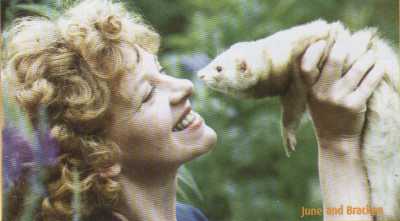Festive Treats and Temptations
 Dr June McNicholas takes a look at what to give your ferret as a treat this Christmas or indeed at any time of the year.
Dr June McNicholas takes a look at what to give your ferret as a treat this Christmas or indeed at any time of the year.
I'm often asked what is suitable for ferret treats or what to offer a ferret that is off its food and/or needs to build up a bit of weight.
The thing to remember is ferrets are carnivores and that their digestive system does not take kindly to high fibre and vegetable matter. Nor do they tolerate salt or sugar easily. This obviously limits 'healthy' treats. However, here is a collection of suggestions from us and other ferret owners on what can be given as treats or to tempt appetites.
Top of the list has to be the bizarrely named duck soup. It's neither duck nor soup but ferrets love it. There's a variety of recipes on the internet but it is basically a semi-liquid concoction of liquidised chicken (cooked) with a small amount of cream or kitten milk, chicken stock and a little butter, dripping or oil. It provides calories and easy eating for ferrets that are off their food through illness or recent operations or who need that little bit extra nutrition. Some of our ferrets have found it a little boring after the first day or so and we have successfully 'spiced it up' with a little ham or garlic sausage to add flavour. For some reason, ferrets can be tempted by strong flavours but do go sparingly on ham, garlic sausage or other processed meats - the salt content is quite high in these sorts of foods and they are not entirely suitable for ferrets except as a short-term measure to get their appetites going.
Next on the list is probably tuna. Tinned tuna in oil (sunflower or vegetable oil) is a good addition to a diet. The protein from the tuna is both palatable and beneficial in the short-term as will as pepping up appetite for sick ferrets or simply giving a treat for healthy ferrets. Oil is the best choice as it gives calories and palatability. Tuna in spring water is a good choice but it will not contain as much in the way of calories or ingredients to help coat condition.
 Other helpful treats are scrambled egg, minced lamb or beef and kitten milk. The kitten milk I refer to is made by either Whiskas or Felix and is available from most supermarkets. It is a milk formula that has all the nutrients of dairy milk but without the lactic acid that can make it hard to digest for animals such as adult ferrets.
Other helpful treats are scrambled egg, minced lamb or beef and kitten milk. The kitten milk I refer to is made by either Whiskas or Felix and is available from most supermarkets. It is a milk formula that has all the nutrients of dairy milk but without the lactic acid that can make it hard to digest for animals such as adult ferrets.
A particular question I am asked quite frequently is one of working out protein levels in a ferret's diet. Here's a rough rule of thumb to work out what foods contain what levels of protein. Remember that young ferrets need a protein level of around 36-40% to thrive. The source of protein should preferably be poultry ie: chicken or turkey. Older ferrets generally need slightly less in the way of protein than younger ferrets, although it may be more important for older ferrets to derive protein from easily digestible sources such as chicken or turkey products so avoid products that list vegetable protein as a major ingredient. This means you need to know how to compare labels on pet food products.
Comparing foods
OK, reading the label is the easy bit - or is it? What if the labels are of different types of food? For example, how do you compare the contents of dry food with that of semi-moist or 'wet' food? In fact you can - and you may be surprised! You'll probably need a calculator but here's an example.
Most of us will be concerned about protein levels and protein sources in a food. The sources will be listed either as greatest first in the list, or as a percentage of the ingredients. Similarly protein amounts are expressed as percentages. So what has most protein - wet (tinned) food, a sachet of semi-moist food or a dry food? The way to tell is to look at the percentage of protein against the percentage of moisture in the food.
Typically, a wet food has 8% protein and 75% moisture; a semi-moist has 20% protein and 25% moisture; a dry cat food has 30% protein and 10% moisture; a dry ferret food has 36% protein and 10% moisture. How do we compare them?
Firstly, calculate the dry matter in the food by taking the percentage moisture from 100%. For example, the wet food with 75% moisture has 25% dry matter (100%-75%). Divide the stated protein level on the label by the dry matter percentage and multiply by 100 eg: wet food is 8% protein and 75% moisture. The dry matter content is 100%-75% =25%. Eight divided by 25, multiplied by 100 is 32. Therefore, the comparable amount of protein from a wet food is 32%.
By the same method the comparable protein content of semi-moist food is 20/75x100 = 27%. Dry cat food is 30/90x100 = 33%. Dry ferret food is 36/90x100 = 40%.
Of course, whether you should use the food for your ferrets will also depend on what sort of protein it is, what the proportion of other ingredients are, etc. However, it does give food for thought, doesn't it?!
We feed a complete ferret food to most to most of our ferrets with little or no supplementation, although I do like to feed some soaked food every so often. However, for our old ferrets, I tend to use a lower protein feed, often a semi-moist type, or a home-prepared mix of chicken meat and chicken fat. This is because older animals often do well on a slightly reduced protein and fat diet and seem to do better on a less dry diet, possibly as it poses less problems for ageing kidneys.
Until we get more recognition for ferrets in the pet food market, we need to take the initiatives ourselves to safeguard our ferrets' diet. Hopefully, some of the information has been useful in giving suggestions for treats (and believe me, ferrets do love them!) as well as a few ideas for ferrets who need a bit of dietary help to recover from illness, operation or simply to build up a bit of weight when needed.
So, if any of the info above is new to you, indulge your ferrets (a little!) this Christmas and safely file anything that might be helpful in items when your ferret needs a little bit extra to tempt his/her ailing appetite.
I'm sure there are even more helpful suggestions out there from readers with tried and trusted methods of treating their ferrets or tempting appetites. Do, please, send them to us at Ferrets First and we will pass them on. Season's greetings to all.
